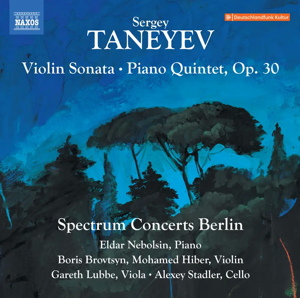
Sergey Ivanovich Taneyev (1856-1915)
Violin Sonata in A minor (1911)
Piano Quintet in G minor, Op 30 (1910-11)
Spectrum Concerts Berlin
rec. 2023, Jesus-Christus-Kirche, Berlin-Dahelm, Germany
Naxos 8.574566 [68]
Spectrum Concerts Berlin is a musical collective brought together under the artistic directorship of American-German cellist Frank S. Dodge. A quick look at their website reveals an extended artist roster of exceptionally fine players who come together as the chosen repertoire and their individual diaries permit. Over the years, their discography – especially on Naxos – has grown to the point that whatever the repertoire being performed and recorded, I try to hear it, as artistic and performing excellence is guaranteed. As hoped and expected the standard of musical execution here is superb, supported and aided by the excellent recording made in the famous Jesus-Christus-Kirche Berlin.
This is Spectrum Concerts Berlin’s second disc of Taneyev for Naxos; the previous volume coupled the Op.31 String Trio (the adjacent work to the Piano Quintet here) and the Op.20 Piano Quartet. Alongside the Piano Quintet on this new disc is the Violin Sonata in A minor which dates from the same year as the Quintet but without an opus number – indeed, according to the liner note, it was not published until some three decades after his death. In the context of the Russian musical scene in which he was deeply involved, Taneyev remained steadfastly outside the dominant Russian Nationalist movement. A pupil of Tchaikovsky, he in turn counted Glière, Lyapunov, Medtner, Rachmaninov and Scriabin amongst his own students. He was an acknowledged master of counterpoint with an emphasis on structure and formal balance as well as motivic development that at first glance appears far more “academic” than many of his immediate contemporaries and colleagues.
The two works offered here could not be more different; the only thing they seem to share – apart from the year of composition – is a standard four movement form. The Violin Sonata opens the disc and I must admit I find it a very curious and ultimately uncompelling work. Unsurprisingly, the form of the work is effective and well-balanced with six and a bit minute allegros framing a flowing Adagio and rather genteel Minuetto. Given the lack of opus number and delayed publication, I found myself wondering if this was created by the composer as much as a self-imposed exercise in a kind of neo-classical style rather than a work for public consumption. The sweeping, big-boned Quintet is so clearly designed and intended to please an audience that the sonata feels more like a private affair. The writing for both instruments is measured and almost anti-virtuosic. Of course violinist Boris Brovtsyn and pianist Eldar Nebolsin play it with supreme technical polish and musical sensitivity but even they cannot save a work that lacks any real substance – and that is before you even begin to consider the 1911 composition date. Taneyev was never going to be at the cutting edge of musical development; among the premieres that year were Sibelius conducting his Symphony No.4 in Helsinki, Ravel’s L’heure espagnole at the Opéra-Comique in Paris, Petrushka in Paris and Mahler’s Das Lied von der Erde in Munich, for starters, but clearly artists of the stature of Brovtsyn and Nebolsin feel there is a value and quality in this work that makes it worth their time to learn and perform, so I will return to this performance hoping for some greater sense of revelation.
If my reaction to the Sonata is one of disappointment mixed with indifference, the Piano Quintet in G minor Op 30 is a grab-you-by-the-throat, how-have-I-never-heard-this-before, super-Romantic, thrilling ride. First and foremost, this is a big piece – literally double the length of the Sonata; 45:13 compared to 22:50 but where the smaller/shorter scale of the sonata dragged, here even the extended 19:01 opening Introduzione: Adagio mesto – Allegro patetico compels from first note to last. Likewise, the level of technical demands made of all five players is cranked right up and thrillingly met by the players here. Of course, a quick look at the catalogue shows that the stature and quality of this work has been recognised by many other labels, ensembles and groups over the years – perhaps the ‘All-Stars’ version on DG led by Mikhail Pletnev on piano is the most obvious example. Taneyev being Taneyev, form and motivic development are again key; liner note writer Carlos Maria Solare points out the various inter-relations between themes and how they develop. This does make one admire the sheer craft and skill that the composer deploys, but at the end of the day it is the sense of totality and expressive impact on the listener that registers more than the technical skill at work. For example the third movement Largo is based on a passacaglia-like descending scale that repeats around forty times during this movement. Of course, even at first listening you are instantly aware of this repeating figuration but it is the sense of cumulative power that resonates. Likewise, in the closing Allegro Vivace, Solare notes how the second theme from the first movement is combined with the main theme of the Finale to bring this hugely impressive work to a towering close.
I recommend this disc for the powerful and compelling performance of the Piano Quintet alone. Spectrum Concerts Berlin continues to deliver performances of unusual repertoire warmly recorded and stunningly played.
Nick Barnard
Buying this recording via a link below generates revenue for MWI, which helps the site remain free.




















